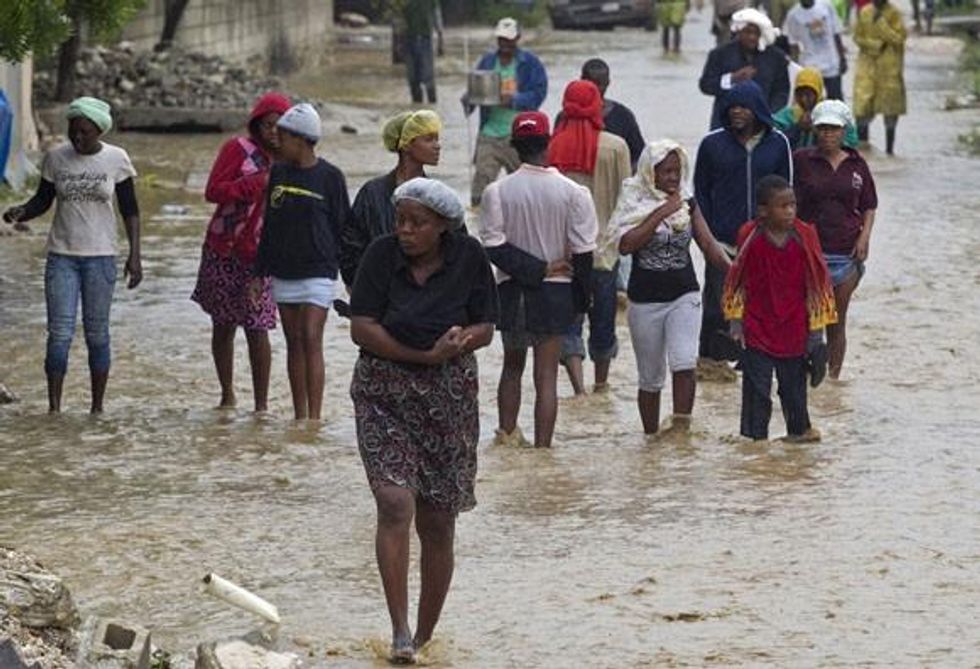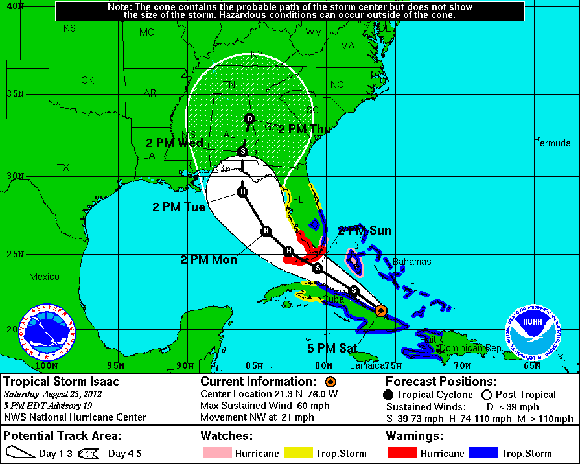

SUBSCRIBE TO OUR FREE NEWSLETTER
Daily news & progressive opinion—funded by the people, not the corporations—delivered straight to your inbox.
5
#000000
#FFFFFF
To donate by check, phone, or other method, see our More Ways to Give page.


Daily news & progressive opinion—funded by the people, not the corporations—delivered straight to your inbox.

Residents cross a street that flooded due to Tropical Storm Isaac in Port-au-Prince, Haiti, Saturday, Aug. 25, 2012. Tropical Storm Isaac swept across Haiti's southern peninsula early Saturday, dousing a capital city prone to flooding and adding to the misery of a poor nation still trying to recover from the terrible 2010 earthquake. (AP/Dieu Nalio Chery)
Tropical Storm Isaac has killed at least four people in different parts of Haiti, with more than 4,000 people still remaining in temporary emergency shelters. Issac was expected to strengthen into a hurricane before hitting the Florida Keys on Sunday and crossing into the Gulf of Mexico.
Lashing rains and gale-force winds and high winds were reported along parts of Haiti on Saturday. The impoverished Caribbean nation is still reeling from the effects of a devastating 2010 earthquake that killed more than 250,000 people.
In addition to those in temporary shelters, more than 350,000 survivors of the last earthquake are still living in fragile tent and tarpaulin camps near the capital.
Intermittent power outages affected the greater areas of the capital city of Port-au-Prince area as Isaac bore down on the impoverished Caribbean country.
Life-threatening flash-floods and mudslides, which are common in Haiti, could add to the misery of the displaced Haitians.
Damage had so far been less than feared, said George Ngwa, Haiti spokesman for the United Nations Office of Coordination of Humanitarian Affairs.
"We don't have any serious reports of major flooding or mudslides so far," he said.
Long lines had formed outside supermarkets in the Haitian capital on Friday as people filled stores to stock up on supplies.
Those still without proper shelter after the quake "remain amongst the most vulnerable, should the storm hit the city", said Jean-Claude Mukadi, Haiti's national director for the humanitarian group World Vision.
"Without a stable sanitation system or permanent housing, heavy rain and wind can create much larger problems like disease from water contamination."
President Michel Martelly, who canceled a trip to Japan, earlier took to the airwaves with safety advice and to urge Haitians to follow the directions of civil defence personnel.
Deforestation has made the country highly vulnerable to landslides and flash flooding.
"These rains could cause life-threatening flash floods and mudslides," the NHC said.
Isaac may hit the U.S. coast as a Cat 2 hurricane somewhere between the Florida Panhandle and New Orleans at midweek.


Trump and Musk are on an unconstitutional rampage, aiming for virtually every corner of the federal government. These two right-wing billionaires are targeting nurses, scientists, teachers, daycare providers, judges, veterans, air traffic controllers, and nuclear safety inspectors. No one is safe. The food stamps program, Social Security, Medicare, and Medicaid are next. It’s an unprecedented disaster and a five-alarm fire, but there will be a reckoning. The people did not vote for this. The American people do not want this dystopian hellscape that hides behind claims of “efficiency.” Still, in reality, it is all a giveaway to corporate interests and the libertarian dreams of far-right oligarchs like Musk. Common Dreams is playing a vital role by reporting day and night on this orgy of corruption and greed, as well as what everyday people can do to organize and fight back. As a people-powered nonprofit news outlet, we cover issues the corporate media never will, but we can only continue with our readers’ support. |
Tropical Storm Isaac has killed at least four people in different parts of Haiti, with more than 4,000 people still remaining in temporary emergency shelters. Issac was expected to strengthen into a hurricane before hitting the Florida Keys on Sunday and crossing into the Gulf of Mexico.
Lashing rains and gale-force winds and high winds were reported along parts of Haiti on Saturday. The impoverished Caribbean nation is still reeling from the effects of a devastating 2010 earthquake that killed more than 250,000 people.
In addition to those in temporary shelters, more than 350,000 survivors of the last earthquake are still living in fragile tent and tarpaulin camps near the capital.
Intermittent power outages affected the greater areas of the capital city of Port-au-Prince area as Isaac bore down on the impoverished Caribbean country.
Life-threatening flash-floods and mudslides, which are common in Haiti, could add to the misery of the displaced Haitians.
Damage had so far been less than feared, said George Ngwa, Haiti spokesman for the United Nations Office of Coordination of Humanitarian Affairs.
"We don't have any serious reports of major flooding or mudslides so far," he said.
Long lines had formed outside supermarkets in the Haitian capital on Friday as people filled stores to stock up on supplies.
Those still without proper shelter after the quake "remain amongst the most vulnerable, should the storm hit the city", said Jean-Claude Mukadi, Haiti's national director for the humanitarian group World Vision.
"Without a stable sanitation system or permanent housing, heavy rain and wind can create much larger problems like disease from water contamination."
President Michel Martelly, who canceled a trip to Japan, earlier took to the airwaves with safety advice and to urge Haitians to follow the directions of civil defence personnel.
Deforestation has made the country highly vulnerable to landslides and flash flooding.
"These rains could cause life-threatening flash floods and mudslides," the NHC said.
Isaac may hit the U.S. coast as a Cat 2 hurricane somewhere between the Florida Panhandle and New Orleans at midweek.


Tropical Storm Isaac has killed at least four people in different parts of Haiti, with more than 4,000 people still remaining in temporary emergency shelters. Issac was expected to strengthen into a hurricane before hitting the Florida Keys on Sunday and crossing into the Gulf of Mexico.
Lashing rains and gale-force winds and high winds were reported along parts of Haiti on Saturday. The impoverished Caribbean nation is still reeling from the effects of a devastating 2010 earthquake that killed more than 250,000 people.
In addition to those in temporary shelters, more than 350,000 survivors of the last earthquake are still living in fragile tent and tarpaulin camps near the capital.
Intermittent power outages affected the greater areas of the capital city of Port-au-Prince area as Isaac bore down on the impoverished Caribbean country.
Life-threatening flash-floods and mudslides, which are common in Haiti, could add to the misery of the displaced Haitians.
Damage had so far been less than feared, said George Ngwa, Haiti spokesman for the United Nations Office of Coordination of Humanitarian Affairs.
"We don't have any serious reports of major flooding or mudslides so far," he said.
Long lines had formed outside supermarkets in the Haitian capital on Friday as people filled stores to stock up on supplies.
Those still without proper shelter after the quake "remain amongst the most vulnerable, should the storm hit the city", said Jean-Claude Mukadi, Haiti's national director for the humanitarian group World Vision.
"Without a stable sanitation system or permanent housing, heavy rain and wind can create much larger problems like disease from water contamination."
President Michel Martelly, who canceled a trip to Japan, earlier took to the airwaves with safety advice and to urge Haitians to follow the directions of civil defence personnel.
Deforestation has made the country highly vulnerable to landslides and flash flooding.
"These rains could cause life-threatening flash floods and mudslides," the NHC said.
Isaac may hit the U.S. coast as a Cat 2 hurricane somewhere between the Florida Panhandle and New Orleans at midweek.

